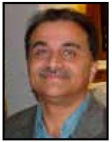Fareed Ayaz & Abu Muhammad Brighten Sacramento Area Labor Day Weekend
By Ras H. Siddiqui

Labor Day weekend (2024) brought some pleasant weather to Sacramento, a welcome break, since the area had been experiencing some extended periods of extreme heat in the months of July and August. Another unexpected, pleasant surprise was a private gathering in Placer County which brought with it a Qawwali performance by Fareed Ayaz and Abu Muhammad and their party. And it turned out to be quite an evening.
A very interesting mixture of vocals and music, Qawwali has a deeply spiritual dimension too. It originated in Northern India around the city of Delhi in the early 14 th century and gained traction at the shrines of Sufi saints. This tradition has continued and now has a permanent presence in Pakistan and India, and in smaller pockets of Afghanistan and Bangladesh.
Qawwali is not exactly a household name in the Western world, but it has succeeded in making some inroads. Its most well-known practitioner in the West was the late Nusrat Fateh Ali Khan (1948-1997) whose musical cooperation with Peter Gabriel on the soundtrack of the movie, The Last Temptation of Christ was well received. He also worked with Pearl Jam's lead singer Eddie Vedder on two songs for the movie soundtrack of Dead Man Walking. Nusrat, who was born in Pakistan, became an international phenomenon, one who not only sang in the Urdu/Hindi languages but in Punjabi too. This was deeply appreciated by the worldwide Sikh community as well, especially within its Diaspora in America, Britain and Canada.
This musical art form is also a family tradition passed on from generation to generation. Many of these Qawwali performing families can trace their roots back centuries. The Sufi saint and poet Amir Khusrau (1253-1325) laid the foundation of Qawwali during the days of the Delhi Sultanate in what is now India. Khusrau was a disciple of Nizamuddin Auliya (1238-1325), another saint whose shrine I was once lucky enough to visit in the year 2004.
The Sufis preach and practice a very inclusive version of the Islamic faith, one which incorporates music and song in praise of Allah (SWT), our Prophet (SWW), and other religious figures including the Imams. Qawwali may also have been born due to the meeting of Turkic, Persian and local Indian culture. Its method of delivery may be different, but its resulting impact (Haal) exhibits some similarities to the Whirling Dervish of Turkish origin. One could also describe it as a South Asian form of American Gospel Music which itself has incorporated African influence.
Now to the present. Just when one had thought that the chances of attending an authentic Qawwali performance in our area of California were slim to none, we received an invitation to one. And since it was Labor Day weekend and the performers were familiar to us, it was an offer which we could not refuse. Fareed Ayaz and Abu Muhammad are two of the finest traditional practitioners of their craft around. These brothers hail from Pakistan and carry on several generations of their family tradition. And luckily for us, they were, performing in our very own neighborhood.
We last saw them perform at Stanford University’s Dinkelspiel Auditorium almost two decades ago and they still retain their originality and dedication to the craft. Their main medium of communication remains their singing voice combined with the rhythmic clapping of the hands by their group, along with harmoniums and percussion (tabla and dhol).
Fareed Ayaz and Abu Muhammad along with nine others in their ensemble entertained us for more than two hours here at this event without taking a break. They started off with Allahu Allahu followed by Maula Ya Salli Wa Sallim, Tajdar E Haram, Man Kunto Maula, Chaap Tilak, Shikwa Jawab-e-Shikwa, Mera Piya Ghar Aaya, Bhar do Jholi, and Dekh Liya. They ended their performance with a vigorous Dam-a-Dam Mast Qalandar. For those who have had a chance to experience a well-done Qawwali performance, a feeling of spiritual ecstasy is often described. This was one such night of abandonment.
During a post-show conversation, I reminded Fareed of his appearance in 2006 at Stanford where he performed along with rock musician Salman Ahmad (Sufisal). Fareed’s memory is better than mine because he in turn reminded me that Indian music composer and song writer A.R. Rahman was also there at that event. Since then, Rahman has won two Oscars and Grammy Awards amongst many others. Fareed added that Allah has really blessed Rahman with a place of well-deserved honor. It is a small world indeed because I was sitting close to Rahman at that Stanford event, and did not get his autograph or take his picture. But then again who can predict that the person sitting near you today will become a famous success story tomorrow?

